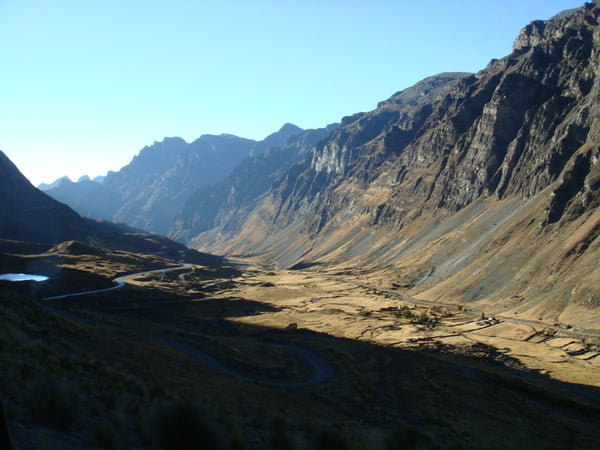BOLIVIA.
A landlocked country also said to be home to the largest indigenous population in the Americas with over 50% of its inhabitants still preserving their traditional beliefs and lifestyles.
Being the highest country of the Americas with elevations ranging from sea level to over 6500 masl (Nevado Sajama - an inactive stratovolcano - the highest mountain in Bolivia) it also boasts an array of complex ecosystems, high levels of biodiversity and stunning landscapes.
The country is split into 5 geographic regions, all with their own micro climate – the stark Andes and Altiplano in contrast to the Yungas area with its lush and fertile highland valley and the scrub-land of the Chaco to the impenetrable and dense Amazon basin.
COFFEE AND THE INFAMOUS ‘DEATH ROAD’
Coffee in Bolivia is mainly concentrated in the rural areas of the Yungas region, particularly the Caranavi province, north of the city of La Paz. Here is where 95% of all of Bolivia’s coffee is produced and cultivated. Although Bolivia has a long history of coffee production there is not much detailed information on commercial coffee production prior to 1880.
Bolivia has all of the components to become a truly high-quality coffee producing country. The Yungas region is ideal with its high altitude, fertile soil, and consistent weather system favourable to coffee growing and this why, as mentioned above, here is where most of the country’s coffee is grown.
However, as with many coffee producing countries in the Americas, the terrain causes a catch-22 situation. Although favourable, the terrain here in Bolivia is rugged and the lack of infrastructure and technologies has historically made it exceedingly difficult for the growers making the production and export of coffee a huge challenge for Bolivia.
In the past, the coffee cherries collected in the humid Yungas valley had to travel a long way to reach La Paz where the processing of the coffee took place. The coffee had to travel high mountain passes and the main road connecting the coffee region to La Paz, included the infamous Camino de la Muerte - ‘Death Road’ one of the most dangerous roads in the world (Top Gear fans, remember the Bolivia episode?). The difficult journey did not end in La Paz, as the coffee then would have to travel further to get to port. As you can imagine, Bolivia being a landlocked country, this was also quite a challenge.
The problem created as a result, was that the coffees took too long to get to port and during its travel, the depulped coffee was exposed to extreme temperature fluctuations (ranging from high humidity to even snowfall at elevations of 2000 masl). The coffee would freeze and thaw during transit and the storing of the coffee in high altitudes prior to export was also a contributing factor to quality loss. So, when the coffee eventually arrived into the US or Europe, the coffees did not fare well at the cupping table.
SMALL CHANGES CAN MAKE A HUGE IMPACT
In 2001 the USAID alongside with the Bolivian government launched a program, creating a platform to demonstrate the region’s ability to produce high quality coffee. The program would also help farmers shift their energy from growing coca (which was prevalent in the region) to growing coffee.

These simple but incredibly important steps, the arrival of ‘The Cup of Excellence’ competitions in 2004 and the Bolivian Coffee Association’s work has increased quality awareness and consequently the quality of the coffee in Bolivia.
The initial program and development of coffee production in Bolivia was further reinforced by additional investment by international organisations interested in providing alternatives to coca production in the country.
A TRUE TURNING POINT
An earlier step taken by the Bolivian government back in 1991 where it expropriated most of the large farms and haciendas and redistributed them back to rural families has given Bolivia an advantage.
Bolivia is now a haven for micro-lot coffees. A huge 90% of farms are run and managed by families where every member of the family contributes to a part of the process within the farm. The smallholders are mostly under cooperatives and each farm size ranges from 1-8 hectares, all Arabica coffee and all organically grown.
BIO ARABICA COOPERATIVE – ENVIRONMENTAL COMMITMENT AND REFORESTATION
We are extremely proud of the Bolivian coffee we are introducing.
It comes from the Cooperativa Agropecuaria Bio Arabica. This cooperative currently have 35 producing partners across 40 families and was established back in January 2013. It grew out of an older cooperative where the younger members of 12 of the families decided to form their own. They formed the cooperative wanting to focus on the environmental concerns of coffee production. They hence decided to dedicate the cooperative to Fairtrade and organic coffee production.

Plans were put in place for the renovation of all the coffee plantations. So, a year after the cooperative was formed the first phase of the plan was carried out where the plants with greater resistance to diseases and pests were selected. This first phase was carried out on 8 hectares with 32,000 pots of coffee seedlings.
The second phase, in 2015, involved 16 hectares with 64,000 potted seedlings, 11 hectares were renovated in 2016 and further hectares renovated in 2017 and 2018 bringing the total to 59 renovated hectares overall.
Following its establishment in 2013, these young producers with an average age of 30 years, have managed to build a cooperative which produces high quality coffee which is certified Fairtrade and Organic. They are truly dedicated to their mission and values.
Their mind set has been forward thinking and this has extended into the gender issue within the coffee producers. Here, women producers have the same rights and obligations and have equity within the councils governing the cooperative. The cooperative’s view on women producers within it, is that they form a fundamental role within the workplace which is just as important as their role within the family. Women are able to bring their kids to work, truly making it a family affair.
The cooperative is also committed to reforestation through their belief in taking care of the environment they use to make a living. They are sowing timber tree such as Mara and Cedar as well as banana, papaya, and citrus trees. These are sown within their crops and as well as being good for the environment and some of the trees producing fruit for consumption by the families, the trees also provide valuable shade, more nutrients and natural fertilisers to the coffee plants within the plots.

It is truly great to see young people of both genders taking the lead and shaping their own future, caring for the quality of what they produce and ensuring they give back to the environment they use to make a living.
I honestly hope these families continue to love what they do and continue to produce wonderful coffee. I hope we continue to be able to purchase their wonderful coffee from them and help them keep to their mission and values.
This story for me, is one that has for some reason resonated slightly deeper with me. Why? Not sure, perhaps because its rare to see younger generations taking on this hugely challenging and demanding task of growing and producing coffee. Maybe it just highlights the hard work that is involved and the journey the coffee takes before it even reaches us. Maybe it highlights that our cup of coffee is not an insignificant part of our daily routine!
Enjoy!
https://quantumroasters.co.uk/products/bolivia-cafe-yungas?variant=31858947948627



